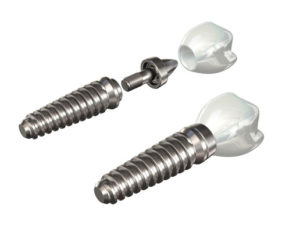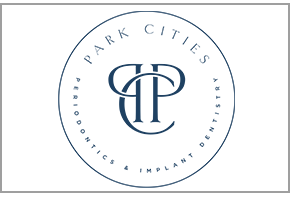 About the only permanent teeth you can afford to lose without replacing are the third molars (wisdom teeth). These are the last teeth to erupt; and in many cases are more problematic when they are left in. Any other tooth loss can disrupt your ability to chew correctly, speak clearly, and smile without embarrassment. Dental implants are a solution to tooth loss that is like having your natural teeth back.
About the only permanent teeth you can afford to lose without replacing are the third molars (wisdom teeth). These are the last teeth to erupt; and in many cases are more problematic when they are left in. Any other tooth loss can disrupt your ability to chew correctly, speak clearly, and smile without embarrassment. Dental implants are a solution to tooth loss that is like having your natural teeth back.
A dental implant is a titanium post that is surgically placed in gum tissue where tooth loss has occurred. Jawbone will fuse to the implant during a healing period (a process known as osseointegration). Eventually, the implant will become a permanent part of the dental anatomy providing a solid base for the cosmetic restoration it will support.
Unlike other methods of replacement where artificial teeth merely rest against gum tissue, the bone where the dental implant has been placed will actually strengthen, preventing gum tissue from shrinking over time. Bone atrophy following tooth loss can alter one’s appearance; other methods of tooth replacement will likely require replacement as they will probably not fit the same as gum tissue shrivels due to bone loss.
Once the periodontist places the dental implant, it will have a protective covering while healing occurs. The patient will be instructed how to keep the area clean to prevent infection (a leading cause of implant failure).
When healed, a restoration will have been made that matches surrounding teeth in size, shape, and color. An abutment is attached to the dental implant allowing the cosmetic restoration to be cemented in place.
The patient will now be able to enjoy all the foods they love … there are no restrictions. There will never be concern about slippage as the restoration is permanently cemented into place allowing the patient to chew, speak, and smile with renewed self-confidence.
Caring for a dental implant is the same as what you do for your other natural teeth. Brush and floss daily. Your dentist will demonstrate the correct way to floss your new tooth. Visit your dentist every six months for cleaning and dental exam. Your dentist will inspect your dental implant to assure all is well … while there is no concern about dental decay with a dental implant, it is very important to take care of gums to prevent gum disease.
To learn more about your tooth replacement options, contact our team at Park Cities Periodontics and Implant Dentistry and schedule your consultation today.






